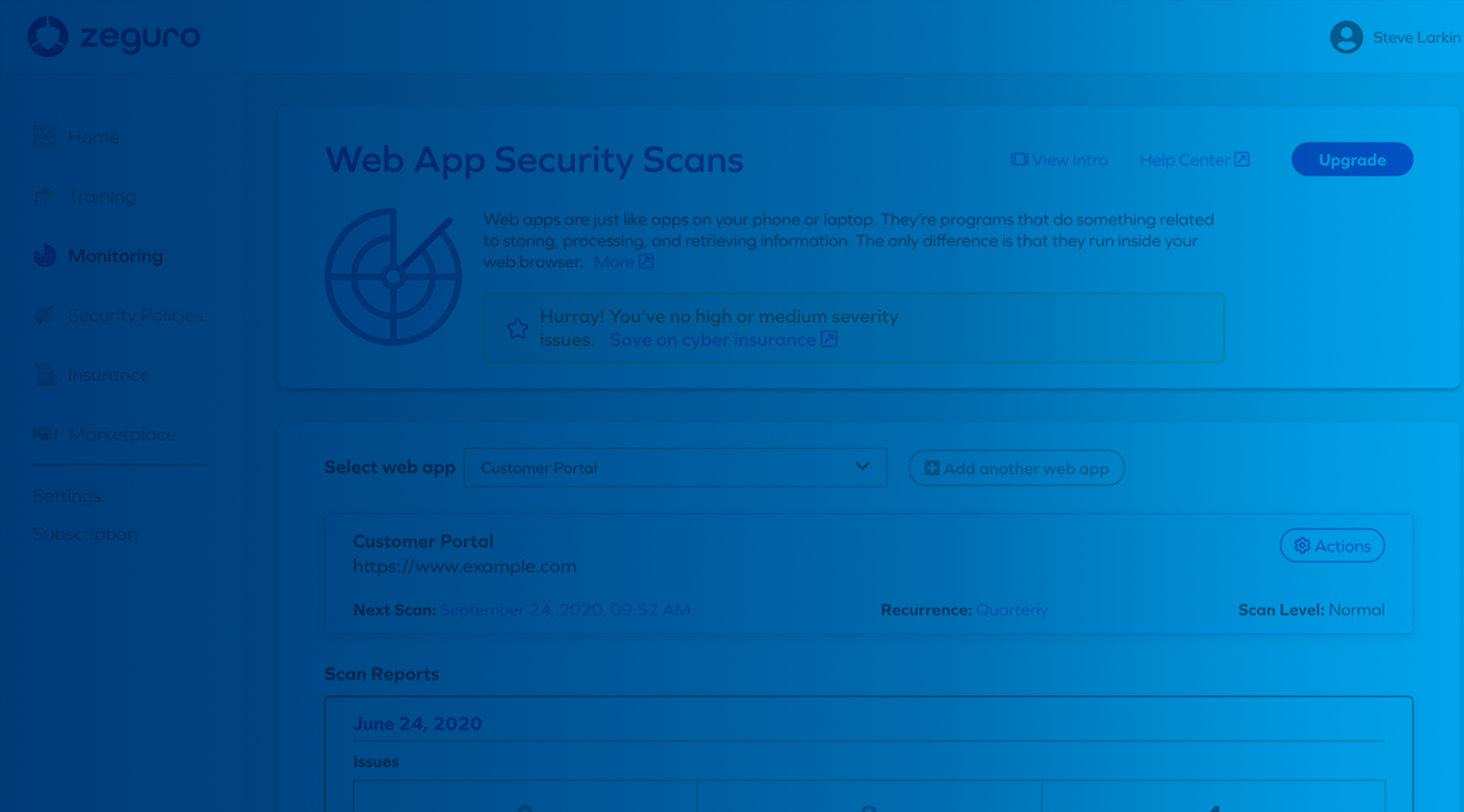
Zeguro CEO On How To Overcome Cybersecurity Marketing Challenges
Since the start of the COVID-19 pandemic and the transition to remote work, the number of reported cyber attacks has...
Since the start of the COVID-19 pandemic and the transition to remote work, the number of reported cyber attacks has skyrocketed, highlighting the critical need for greater cybersecurity adoption. The growth of the cybersecurity industry has soared over the last couple of years with digital transformation, regulatory compliance, increased security threats due to COVID-19, and response capabilities all playing a role, according to a recent Gartner report. Global information security and risk management end-user spending is now forecasted to reach $174.5 billion in 2022.
While the industry is booming, countless cybersecurity companies are jockeying for a piece of that business. It’s becoming increasingly difficult for cybersecurity companies to differentiate themselves in a saturated market, and for many, breaking through means overcoming critical marketing challenges around brand awareness, market education, and building trust.
To learn more about how cybersecurity companies are overcoming these challenges, Karbo Communications spoke to Zeguro’s CEO and co-founder Sidd Gavirneni, and Digital Marketing Manager Ellen Zhang. In a crowded market, Zeguro is managing to stand out. By integrating cybersecurity and cyber insurance, Zeguro is creating a new product category and finding a foothold with small and medium sized businesses. In our virtual “In the Know” discussion, Sidd and Ellen shared Zeguro’s strategies for building trust, educating target audiences, and gaining traction in the saturated cybersecurity market.
Tell us a little bit about what inspired you to start Zeguro and how you identified a need in the market for integrated cybersecurity solutions and insurance?
Sidd: I’ve been in cybersecurity for over 20 years. Prior to Zeguro, I was managing Polycom’s product portfolio and served on their information security board when they experienced a data breach. Typical phishing attack, you know, someone asking the HR person to send out employee data and he does. During the aftermath of that breach, I came to learn that dealing with cyber insurance can be a really painful process.
Around the same time, my Zeguro co-founder, Dan Smith, was in the process of renewing cyber insurance for the bank he was working for. It was a nightmare. The whole process was broken and it took him about three months just to renew. Also happening at this time, a friend of mine, who runs a clinic in Houston, experienced a data breach—another phishing attack. The small business need for better cybersecurity insurance was quickly coming into focus. So Dan and I co-founded Zeguro in 2016 to address this clear market need and to help small businesses.
As an insurtech startup, what are a few ways you are positioning Zeguro as a better alternative to the more established and traditional insurance companies?
Sidd: Traditional insurance is sold through brokers. If a small business wants to get a cyber insurance policy, they go to a broker and have to fill out a two or three-page paper questionnaire. Then the broker sends the questionnaire to the insurer, and the insurer either approves or rejects them. If the insurer approves them, the broker sends a quote to the customer, who can then purchase the policy. This whole inefficient process can take up to a week or more.
With the Zeguro platform, everything is digital and easy for the small business. They can get a quote and purchase their policy in less than five minutes. This is one way Zeguro is bringing insurance into the digital age.
And then the other piece is making insurance easy to understand for these businesses. If you look at our messaging, our website, and everything within the customer’s purview, you’ll see that we take great care to make all of the insurance legalese digestible and that we’re always clearly addressing the pain points of our customers. The same thing goes for security.
Our approach of making cybersecurity and insurance easy and integrated is what makes us different from any other insurance company.
According to experts, cybersecurity is the fastest-evolving threat landscape insurers must deal with. Cyber attacks get more sophisticated and less predictable every day. While traditional insurance companies may struggle to keep pace, Zeguro appears uniquely positioned to succeed because of its integrated model.
Can you elaborate on your key differentiators?
Sidd: Historically, cyber insurance companies have had a problem with data: no insurance company has enough data to create accurate pricing and better serve the customer by providing a tailored cyber insurance product.
That’s where Zeguro comes into play. Our approach of integrating cybersecurity with cyber insurance helps us better underwrite and provide tailored cyber insurance to our SMB customers in a way that our competitors can’t. Our approach to cyber risk management is uniquely holistic. Zeguro makes it easy for small businesses to understand cybersecurity by making it approachable and telling them exactly what they need to do to also save on their insurance. Zeguro customers who buy our insurance get the security platform for free. And customers who buy our security platform get insurance at a lower premium cost because their risks are lower. It’s this integrated approach that makes Zeguro unique.
You have an extensive background in strategic management and product portfolio management working at companies like Polycom and Accept Corporation. How has your previous professional experience influenced Zeguro and its integrated business model?
Sidd: It’s a combination of our team’s professional experiences and personal experiences that have influenced Zeguro to be who we are today. Personally, I grew up in India, moved to the US to Kansas, got my MBA in Spain, and now I’m here in the Bay Area.
I was a software engineer by profession. So, my education centered around computer science and cybersecurity. I worked as a software engineer at a telecom company, and after a few years of that, I was ready to move towards more of the strategic aspects of business.
My MBA was very much focused on entrepreneurship, and after my program, I started working more on business strategy and the product portfolio. It’s a combination of all of these experiences that have helped me to get to where I am today, and it’s our diverse, collective experiences as a team that have also helped us shape Zeguro.
We would love to hear more about diversity at Zeguro. How does diversity contribute to Zeguro’s success?
Sidd: Customer satisfaction is central to Zeguro’s branding and identity. The only way the customer can be fully happy is when we best understand their needs and are able to empathize with them and help them achieve their goals. That’s one thing we have done very well. We have brought in that empathy, which we think is a direct result of our diverse team.
As a team of 12, we have seven countries represented, males, females, LGBTQ, and people of all ages. Having a diverse team helps us work better with each other, but also creates team empathy which eventually flows to our customers. This combination of different views and perspectives is what gets us to keeping our customers happy and satisfied. Through that, we have had quite a few referrals and partnerships develop. Diversity plays a big role in who we are as a company.
How does Zeguro successfully attract such a diverse talent pool?
Sidd: We have a set of core values, and it’s those values we look for in a person versus just finding someone that fits into our culture. We believe that culture should evolve over time and everyone coming in helps shape the culture. So it’s more about those core values, and one of them is diversity. All of these values help us attract folks that believe in diversity. One thing that we do is use talent sourcing tools where we can hide the name and picture of the person and be neutral about things like looks and names.
What are a few of the biggest marketing challenges you face as a cybersecurity company and what strategies are you successfully employing to overcome them?
Sidd: I think the primary challenge, especially with cybersecurity in the SMB space, is awareness and education. Most small businesses don’t know what to do about cybersecurity. Everyone knows that they should be worried, but they have absolutely no idea what to do. And as a result, they just tend to ignore it. One of the biggest challenges that we face is how do we raise awareness without scaring people away from taking action?
Ellen: The other challenge is that we’re creating and defining a new product category by integrating insurance and cybersecurity. It’s not something that people know to search for on Google yet. How do we target the direct consumer? One strategy we’re testing out right now is partner marketing and growing our partnership program.
Sidd: For small businesses, it really comes down to who they know and what they trust. Our partners are already trusted advisors to smaller businesses, and they can be influential. So it’s really the influencer model that we believe will make a big difference in the cybersecurity and cyber insurance space for these SMBs.
As Zeguro leverages partnerships to build trust and recognition with its target market, what co-marketing strategies are proving to be most successful?
Sidd: Zeguro provides full support to every partner that we work with by collaborating on co-branded materials from marketing collateral to webinars to email campaigns. We also have found a lot of mutual benefit in partnering with other security companies to create material that applies to both their customers and our customers in the security space.
Beyond partner marketing, what marketing tactics have proven to be most successful in connecting with that target customer? How has Zeguro tailored its approach to speak to them directly?
Ellen: On the cyber insurance side, using Google AdWords and paid search have been a really good way to get consistent leads. We’ve been doing pretty well and getting leads at a cheaper cost per lead than the market average for insurance. I think it’s been particularly successful for SMBs because they normally don’t have a dedicated risk manager who can work with different insurance firms and brokers to find cyber insurance solutions. So these people would be googling “cyber insurance coverage” and looking for solutions via Google. That’s been a good way for us to get in front of people.
Narrowing customer focus is one of the top marketing challenges cybersecurity companies face. How did Zeguro narrow in on small to midsize companies?
Sidd: The SMB space is extremely underserved when it comes to both cybersecurity and cyber insurance. While more than 60% of large enterprises have cyber insurance, less than 10% of small businesses have it. And yet, 69% of small businesses had a cyber breach in 2019 — that’s a huge number. Small businesses just don’t have the right tools. The security space is extremely fragmented, and most of those tools are geared towards large enterprises, not the SMB space.
Of course, talking to customers is the number one thing you can do to better understand their unique needs, but we also look at statistics and reports from organizations like the Small Business Administration. We take into account published information about the kinds of risks small businesses face, or FBI reporting on cybersecurity and breaches. We also take into account reports from companies like Symantec, which does a great job on their annual reports on the state of cybersecurity. All of these resources help us better understand and define who within the SMB space we should be targeting.
To add to that, cybersecurity has different kinds of adopters. Early adopters are typically tech companies, because they often have a better understanding of cybersecurity even if they don’t have the expertise in-house. So we’re also looking at what the low hanging fruit is and where we don’t have to spend too much effort on awareness versus the other categories.
For a small business with little to no experience on navigating the complexities of cybersecurity, getting started can be a daunting task. How is Zeguro best positioned to help small businesses start inaugural cybersecurity programs, and how do you incorporate that expertise into your messaging?
Sidd: Businesses expect the same level of functionality and user friendliness from their vendors that they get from their personal apps and tools that they use in their day-to-day life. And that is one way that we make cybersecurity easy for these businesses; it’s all about that user experience of our platform on the security side. We try our best to not make it feel overwhelming for a business owner who has no tech experience to be able to get started with cybersecurity. We provide everything that the business needs to get started within the platform that they would otherwise have to get from a security consultant, who would charge them around $10,000 a year. In comparison, our Cyber Safety solution is as little as $59 a month.
Ellen: We position Zeguro as accessible, as you can tell by the language we use throughout our website and platform. The language is not very heavy on cybersecurity terms, as you would see for enterprise solutions that are speaking to dedicated IT or security teams. We’re really tailoring our message towards people who don’t necessarily understand much about cybersecurity or who are beginning their journey into building a cybersecurity program.
And we focus on providing educational content on our landing pages. For example, on our cybersecurity overview page, we have statistics around the percentage of SMBs that experienced a data breach, how much an average data breach costs, and particular solutions. We explain why they should care about employee security training when the majority of businesses experience some type of phishing or social engineering attack. We focus our messaging on both the why and the how, but simplify it down so it’s easy to understand.
Sidd: Visual branding also plays an important role in this. Our brand colors — pink, purple, and navy — also make Zeguro fun and accessible, rather than the traditional, corporate-looking dark blue that every security or insurance company uses.
[perfectpullquote align=”full” bordertop=”false” cite=”” link=”” color=”#6cdbf9″ class=”” size=””]I don’t think that there’s any specific area that requires the most education. Every company and every person has a different idea and knowledge level when it comes to cybersecurity, so it’s really about addressing multiple aspects.[/perfectpullquote]
On the Zeguro resource page you have a consistent cadence of educational blog posts, ebooks, and guides. It’s clear that providing educational resources is a key component of your marketing strategy.
What are the top education hurdles Zeguro faces and what tactics are your teams employing to overcome them?
Sidd: I don’t think that there’s any specific area that requires the most education. Every company and every person has a different idea and knowledge level when it comes to cybersecurity, so it’s really about addressing multiple aspects. Because as I was mentioning earlier, cybersecurity is about taking a holistic approach that addresses people, processes, and technology. Ignoring even a small piece of any of these three aspects can cause a breach. In our educational material, we make sure to focus on all three components.
Zeguro recently hosted a webinar with infosec expert Aaron Kraus on how startups can initiate an SOC 2 report. How effective are you finding these webinars at improving the existing customer experience or earning new business?
Ellen: We’re really just starting on our webinar program, and as we pioneer this new channel for Zeguro, we’ll look to do joint webinars with each of the partners that we sign on. For example, one of our partners is Graphus, a company that helps protect against phishing attacks, so this fall, we are planning on doing a webinar around identifying phishing attacks and preventing them. And so they’re going to talk about their technology and how they can stop phishing attacks from the email perspective, and we’ll discuss how we can better train employees to recognize phishing attacks, and be more cyber-aware.
Sidd: I think these joint webinars will be important for us because there’s no one solution that can solve all the cybersecurity issues or problems. It will have to be multiple companies coming together in the ecosystem to fix the problems that these businesses face. So for us webinars with our partners is what will be the most fruitful.
[perfectpullquote align=”full” bordertop=”false” cite=”” link=”” color=”#6cdbf9″ class=”” size=””]As a security and an insurance company, the primary criteria that our customers look for is trustworthiness, and PR has helped us create that level of trust among our customers and partners.[/perfectpullquote]
What role does PR play in helping Zeguro meet its business objectives?
Sidd: As a security and an insurance company, the primary criteria that our customers look for is trustworthiness, and PR has helped us create that level of trust among our customers and partners. This is accomplished in large part through media coverage and articles related to our product launches, our partnerships with some of the world’s leading insurance companies, and recognition of Zeguro’s award wins. PR plays an essential role.
Late last month you published a report on the state of B2B SaaS cybersecurity, which notably highlighted that almost 84% percent of B2B SaaS companies have allocated budget to cybersecurity infrastructure in 2020.
How do these reports support your marketing efforts, and how are you tracking ROI?
Ellen: We work with an SEO agency and a lot of our early efforts are focused on content marketing and research for the content. Part of the content mix are these big rock assets, like reports with original data. It’s about establishing thought leadership.
The decision to focus this report on B2B SaaS was strategic. Many of Zeguro’s early customers were young SaaS companies, so we figured that would be a good target market as they typically have a better understanding of technology and require a little less education than some of the mom and pop SMB shops.
Tracking ROI for our content marketing is really about our brand awareness. Are we moving up in organic search rankings? Is our organic search traffic growing month to month, year over year? And are we getting more impressions and clicks for the keywords that we care about?
Have you been finding these reports to be an effective method for boosting Zeguro’s rankings?
Ellen: It’s a little too early to tell with this latest report, because we only just published it. But towards the beginning of the pandemic, we published a blog post with free security training resources for SMBs. And since that’s been published, it’s consistently been a top performer for our website and for organic traffic as people are searching for training resources. Especially now since everybody’s working remotely and it’s important to educate your employees.
COVID-19 has completely shifted the corporate landscape as many companies have pivoted to indefinite work from home systems. We’ve observed a dramatic surge and increased sophistication of cyber attacks amid COVID-19.
How has this shift influenced the way Zeguro positions itself to prospective and existing clients?
Sidd: We did not change the way that we talked about ourselves. However, the pandemic and increase in cyber attacks have only highlighted the need for a product like ours. So we started seeing that customers and potential customers started resonating more with the messaging that we already had. COVID acted as a catalyst for us.
Can you talk a little bit more about how COVID-19 has affected Zeguro’s business?
Sidd: Because of COVID, content has been performing very well for us. With very few marketing dollars, we are getting more paying customers and that’s a direct result of all of our content efforts over the last few months within the context of the current climate.
What’s on the horizon for Zeguro and the cybersecurity industry as we move into the second half of 2020?
Sidd: The industry itself will keep soaring, there’s no stopping that. Thanks to the upcoming elections, people are even more concerned and there will be even more cyber attacks. We anticipate gaining a lot more traction over the next few months as we focus more on our channels and partners. That’s where we see the industry shifting as SMBs rely more and more on tools and products that provide multiple things in one place.
Ellen: The biggest thing for Zeguro will be growing our partnership program. I’ll be working with Sidd and Dan on account-based tactics to target potential partners and get them onboard so we can grow that marketplace.
This interview has been edited and condensed for clarity
Learn more about how Karbo Communications can do what we talked about in this blog post for you!
Get in touchResults realized.
Discover how our aggressive, data-driven approach consistently drives business outcomes for organizations like yours.
Get in touch


